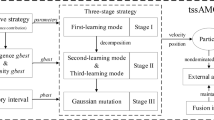Abstract
Optimization problem is one of the most important problems encountered in the real world. In order to effectively deal with optimization problem, some intelligence algorithms have been put forward, for example, PSO, GA, etc. To effectively solve this kind of problem, in this paper, crossing strategy of DNA fragments is proposed to explore the effect on intelligence algorithms based on American genetic biologist Morgan theory. We mainly focus on DNA fragment decreasing strategy and DNA fragment increasing strategy based on disturbance in PSO. In order to test the role of the DNA mechanism, three test benchmarks were selected to conduct the analysis of convergence property and statistical property. The simulation results show that the PSO with DNA mechanism have an advantage on algorithm performance efficiency compared with the original proposed PSO. Therefore, DNA mechanism is an effective method for improving swarm Intelligence algorithm performance.
Access this chapter
Tax calculation will be finalised at checkout
Purchases are for personal use only
Similar content being viewed by others
References
Eberhart, R., Kennedy, J.: New optimizer using particle swarm theory. In: Proceedings of the 6th International Symposium Micro Machine Human Science, pp. 39–43 (1995)
Kennedy, J., Eberhart, R.: PSO optimization. In: Proceedings of IEEE International Conference on Neural Networks, Perth, vol. 4, pp. 1941–1948 (1995)
Kennedy, J.: Small worlds and mega-minds: effects of neighborhood topology on particle swarm performance. In: Proceedings of Congress on Evolutionary Computation, pp. 1931–1938 (1999)
Kennedy J., Mendes, R.: Population structure and particle swarm performance. In: Proceedings of IEEE Congress on Evolutionary Computation, Honolulu, pp. 1671–1676 (2002)
Niu, B., Zhu, Y.: A lifecycle model for simulating bacterial evolution. Neurocomputing 72, 142–148 (2008)
Niu, B., Li, L.: A novel PSO-DE-based hybrid algorithm for global optimization. In: Huang, D.-S., Wunsch II, D.C., Levine, D.S., Jo, K.-H. (eds.) ICIC 2008. LNCS (LNAI), vol. 5227, pp. 156–163. Springer, Heidelberg (2008)
Parsopoulos K.E., Vrahatis M.N.: UPSO-a unified particle swarm optimization scheme. In: Lecture Series on Computational Sciences, pp. 868–873 (2004)
Mendes, R., Kennedy, J.: The fully informed particle swarm: simpler, maybe better. IEEE Trans. Evol. Comput. 8, 204–210 (2004)
Peram, T., Veeramachaneni, K.: Fitness-distance-ratio based particle swarm optimization. In: Proceedings of Swarm Intelligence Symposium, pp. 174–181 (2003)
Liang, J.J., Qin, A.K., Suganthan, P.N., Baskar, S.: Evaluation of comprehensive learning particle swarm optimizer. In: Pal, N.R., Kasabov, N., Mudi, R.K., Pal, S., Parui, S.K. (eds.) ICONIP 2004. LNCS, vol. 3316, pp. 230–235. Springer, Heidelberg (2004)
Liang, J.J., Qin, A.K.: Comprehensive learning particle swarm optimizer for global optimization of multimodal functions. IEEE Trans. Evol. Comput. 10(3), 281–295 (2006)
Angeline, P.J.: Using selection to improve particle swarm optimization. In: Proceedings of IEEE Congress on Evolutionary Computation, Anchorage, pp. 84–89 (1998)
Lovbjerg, M., Rasmussen, T.K., Krink, T.: Hybrid particle swarm optimizer with breeding and subpopulations. In: Proceedings of Genetic Evolutionary Computation Conference pp. 469–476 (2001)
Miranda, V., Fonseca, N.: New evolutionary particle swarm algorithm (EPSO) applied to voltage/VAR control. In: Proceedings of 14th Power System Computation Conference, Seville (2002)
Acknowledgments
This work is supported by the National Natural Science Foundation of China (Grants nos. 71461027, 71001072, 71271140, 71471158). Guizhou province science and technology fund (Qian Ke He J [2012] 2340 and [2012]2342, LKZS [2012]10 and [2012]22); Guizhou province natural science foundation in China (Qian Jiao He KY [2014]295); The educational reform project in guizhou province department of education (Qian jiao gao fa[2013]446); Guizhou province college students’ innovative entrepreneurial training plan(201410664004); 2013 and 2014 Zunyi 15851 talents elite project funding.
Author information
Authors and Affiliations
Corresponding author
Editor information
Editors and Affiliations
Rights and permissions
Copyright information
© 2015 Springer International Publishing Switzerland
About this paper
Cite this paper
Liu, Y., Niu, B., Chan, F.T.S., Liu, R., changling, S. (2015). Application of Disturbance of DNA Fragments in Swarm Intelligence Algorithm. In: Huang, DS., Jo, KH., Hussain, A. (eds) Intelligent Computing Theories and Methodologies. ICIC 2015. Lecture Notes in Computer Science(), vol 9226. Springer, Cham. https://doi.org/10.1007/978-3-319-22186-1_70
Download citation
DOI: https://doi.org/10.1007/978-3-319-22186-1_70
Published:
Publisher Name: Springer, Cham
Print ISBN: 978-3-319-22185-4
Online ISBN: 978-3-319-22186-1
eBook Packages: Computer ScienceComputer Science (R0)




